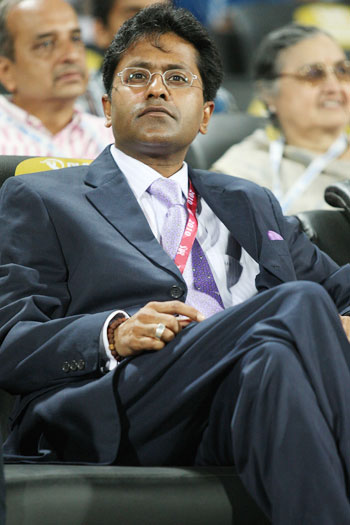 Knives are out for Lalit Modi and the IPL Governing Council is set to sack him as chairman in a potentially volatile meeting on Monday after being rattled by Indian cricket's biggest financial scandal in recent memory.
Knives are out for Lalit Modi and the IPL Governing Council is set to sack him as chairman in a potentially volatile meeting on Monday after being rattled by Indian cricket's biggest financial scandal in recent memory.
The battle lines between Modi and his detractors within the BCCI have been drawn and the beleaguered IPL chairman has decided to skip the meeting, according to sources.
The nationwide tax raids have allegedly unearthed financial bunglings and at the centre of the controversy is Modi, who has been accused of having silent stakes in at least three IPL franchises.
With BCCI's own image also taking a hit due to the IPL row, miffed Board bigwigs boycotted the IPL awards.
Board President Shashank Manohar, secretary N Srinivasan and IPL vice-chairman Niranjan Shah are expected to give the Twenty20 League's final at the D Y Patil Stadium this evening a miss as well due the current imbroglio.
Incidentally, Srinivasan is the MD and vice-chairman of India Cements, which owns the Chennai Super Kings who will be seen in action in the summit clash against Mumbai Indians.
The trio, along with BCCI CAO Prof. Ratnakar Shetty, reached the Board's headquarters inside the Wankhede Stadium on Sunday morning presumably to finalise details about the meeting convened at 10 am by Srinivasan at Manohar's behest.
Modi has taken a defiant stand and refused to quit the IPL chairman's post even though the dice looks heavily loaded against him at the meeting with only former BCCI chief Inderjit Singh Bindra likely to back him.
While Modi has been making his views public through twitter, the BCCI officials have been engaged in closed-door meetings, albeit informally, to work out their plan of action for Monday's meeting.
His support base in the BCCI might be non-exsistent but Modi has found the backing of IPL franchise owners, who feel the league's conceptualiser has become the victim of a media trial and deserves a chance to explain himself.
Modi had, infact, requested that the meeting be deferred by five days to allow him to prepare his case but the BCCI was having none of it.
The extent to which the Modi has been marginalised can be gauged from the fact that the Champions League Twenty20, of which Modi is the chairman, held a meeting without him.
The Board's constitution empowers its Disciplinary Committee "to inquire into and deal with the matters relating to any act of indiscipline or misconduct or violation of any of the Rules and Regulations of any player, umpire, team official, administrator, selector or any other person appointed or employed by the BCCI."
The constitution says that a Disciplinary Committee shall be appointed at every AGM, and it will consist of three persons, one of who shall be the President.
The members of this powerful committee are not known as after the last AGM in Mumbai the Board revealed the names of other committees' members barring this one.
Section 32 (i) of the BCCI constitution also empowers the Board "to frame bye-laws regarding the discipline and conduct of the players, umpires, team officials, administrators, referees and selectors and shall have a power to amend the same from time to time."
Sub-section iv of the BCCI Memorandum and Rules and Regulations deals with the act of indiscipline or misconduct by an administrator of the Board.
It says that "if any administrator of the BCCI commits any act of indiscipline or misconduct or acts in any manner which may or likely to be detrimental to the interest of the Board or the game of cricket or endanger the harmony or affect the reputation or interest of the Board or refuses or neglects to comply with any of the provisions of the Memorandum and/or the Rules of conduct framed by the Board, the secretary, in consultation with the President, issue a show cause notice to that person asking for explanation."
The matter is then referred to the Disciplinary Committee, which conducts a hearing and submits its findings to the BCCI, which would in turn call for a SGM to "take appropriate decision by majority of 3/4th members present and voting".
If an administrator is found guilty and expelled consequent to this, he or she cannot hold any position or office or be admitted in any committee or any member or associate member of the Board.
The expelled person can make a comeback after three years provided his or her readmission is voted in by 3/4th at a general body meeting.
Pending such inquiry, the person would be suspended by the President from "participating in any of the affairs of the Board until final adjudication". The adjudication should be completed within six months.
Photograph: IPL/Getty Images






